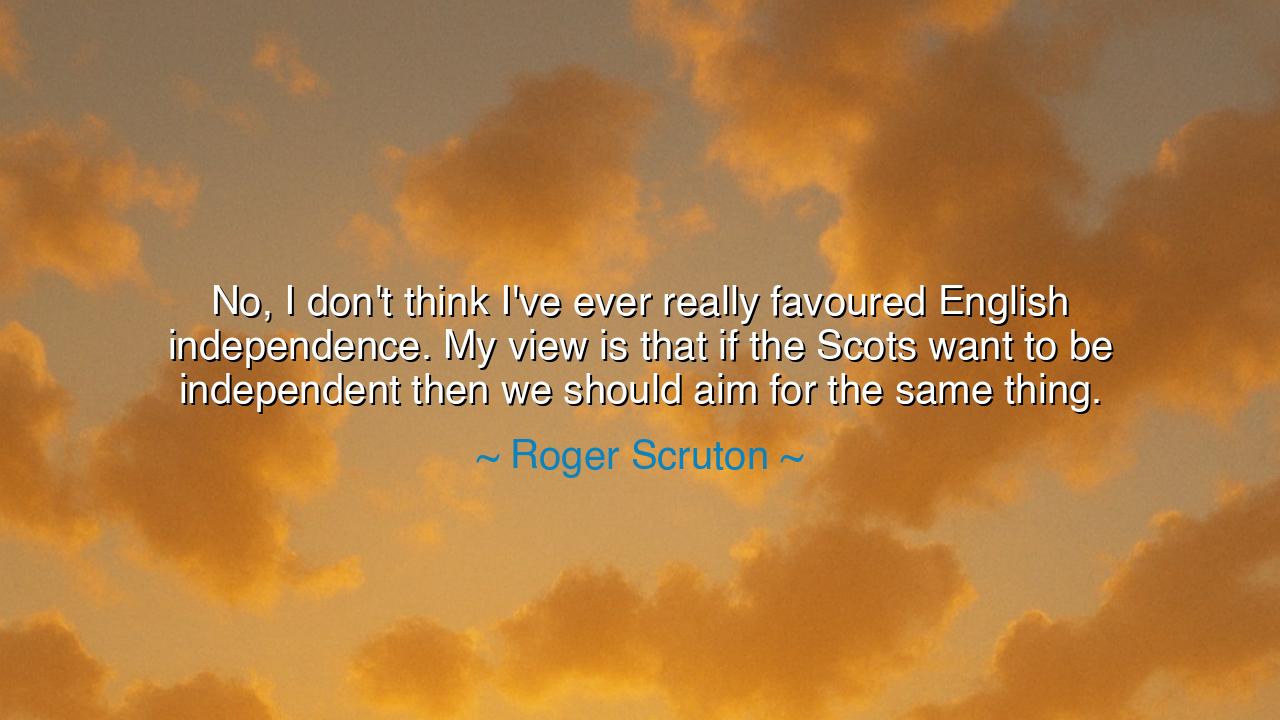
No, I don't think I've ever really favoured English independence.
No, I don't think I've ever really favoured English independence. My view is that if the Scots want to be independent then we should aim for the same thing.






“No, I don’t think I’ve ever really favoured English independence. My view is that if the Scots want to be independent then we should aim for the same thing.” Thus spoke Roger Scruton, the philosopher of nation and culture, whose mind sought not the shouting passions of the crowd, but the quiet foundations of belonging. In these words, he wrestles with one of the oldest questions of the human spirit — the balance between unity and selfhood, between the desire to stand apart and the duty to remain together. His statement is not born of defiance, nor of rivalry, but of reflection: that independence, if it is to mean anything, must be rooted in reciprocity, in the equal freedom of peoples to define their own destiny.
Scruton lived in an age when the great union of Britain began to tremble under the weight of its own history. The Scottish independence movement, long smoldering in the hearts of those who cherished the idea of self-rule, had grown into a flame that touched the very heart of the United Kingdom. The philosopher, though English by birth, saw in their yearning something profound — not mere politics, but the eternal pulse of identity. Yet he also understood that if Scotland sought to reclaim her nationhood, then England, too, must awaken to her own. “If the Scots want to be independent,” he said, “then we should aim for the same thing.” In this, he did not call for division, but for symmetry, for the dignity of mutual recognition between nations bound by shared history yet called by separate voices.
The ancients knew well this struggle of union and independence. In the days of Greece, the city-states — Athens, Sparta, Thebes — wrestled between their fierce local pride and the dream of Hellenic unity. Each sought freedom in its own form, yet they remained kin through culture and faith. So too does Scruton’s thought evoke that ancient balance: that a people’s identity must never be smothered by the weight of empire, nor its freedom surrendered to the illusion of harmony. Patriotism, for him, was not isolation, but rootedness — the love of home, of place, of inherited duty. It is this love that gives meaning to independence; without it, independence becomes mere separation, a hollow cry against the void.
Consider the story of Ireland, whose long road to sovereignty was paved with both triumph and sorrow. For centuries she struggled beneath foreign rule, and when at last she won her freedom, the bond with her neighbor remained scarred but unbroken. The lesson is clear: that independence, if it grows from resentment, breeds only further division; but if it grows from mutual respect, it may heal old wounds. Scruton’s wisdom lies in this — that true independence is not a tearing away, but a standing up. It is the difference between rebellion and self-realization. He saw that if one nation within the United Kingdom sought its own path, the others must not cling in fear, but rise with equal dignity, reaffirming the meaning of nationhood for themselves.
At its heart, his words speak of reciprocal freedom — a principle that transcends borders. Every people, every culture, has the right to self-determination; but that right must also be accompanied by an understanding of what binds them to others. For freedom without friendship is emptiness, and sovereignty without solidarity becomes pride. Scruton, who spent his life defending the sacredness of home and heritage, called for independence not as a breaking of bonds, but as a renewal of them — a covenant between equals, where each respects the other’s love of land and life.
Yet, his statement also carries a quiet warning. To chase independence without understanding its weight is to mistake liberty for ease. A nation, like a person, must ask: what do I gain by standing alone, and what do I lose? The philosopher knew that independence demands responsibility — that it is not the privilege of isolation, but the duty of self-governance. Thus, his words can be read not as an invitation to separation, but as a challenge: that if independence is desired, it must be earned through wisdom, sacrifice, and respect for those with whom one once shared a home.
So let this teaching be carried forward, O child of heritage and heart: cherish your homeland, but honor the homes of others. Seek freedom, but not at the expense of fellowship. If you must stand apart, do so with grace, not with bitterness. For in every age, nations rise and fall not by the force of arms, but by the strength of their understanding — of who they are, and why they stand. Roger Scruton’s words remind us that independence, whether of a country or a soul, must always be tempered by dignity, reciprocity, and love — for only then does it lead not to isolation, but to wisdom.
Thus, in his quiet reflection, the philosopher speaks to the ages: that identity and freedom, though they may walk separate roads, are bound by a single truth — that all true independence must be guided by understanding, and all unity, if it is to endure, must honor the freedom of the hearts that form it.






AAdministratorAdministrator
Welcome, honored guests. Please leave a comment, we will respond soon